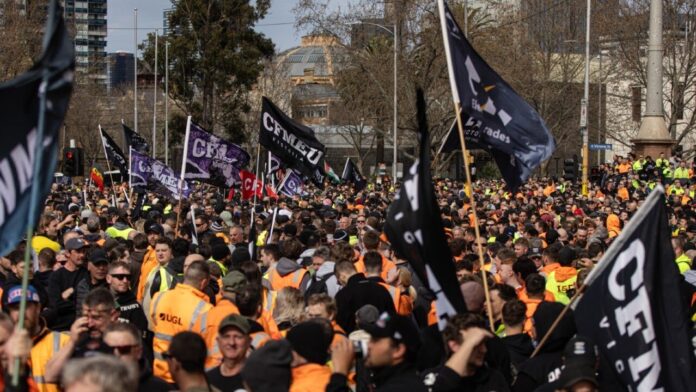Construction workers across Australia rally in major cities, challenging federal intervention and launching legal battles over union control
In a sweeping display of unity and defiance, over 10,000 workers from the Construction, Forestry, Maritime, Mining and Energy Union (CFMEU) walked off their job sites across Australia on Tuesday. The mass protest unfolded in capital cities nationwide, with workers voicing their opposition to the federal government’s recent intervention in the union.
The rally gained momentum when Michael Ravbar, the sacked leader of the CFMEU’s Queensland and Northern Territory branches, announced his intention to challenge the federal takeover laws in the High Court. Ravbar, who was among 21 Queensland leaders dismissed to make way for an administrator, urged the crowd to reclaim control of their union. “This is going to be the biggest challenge and the biggest fight that we’ve ever had, but we’re all up for it,” Ravbar declared to a sea of demonstrators. “You’ve got to get control of your union back. You will never allow a government takeover again.”
In Brisbane, Ravbar’s speech was bolstered by support from leaders of other blue-collar unions, including the Maritime Union of Australia (MUA), the Rail, Tram and Bus Union (RTBU), and the Electrical Trades Union (ETU). ETU State Secretary Peter Ong highlighted the solidarity within the labour movement, stating that funds previously allocated to the Australian Labor Party (ALP) would now support legal challenges against the legislation targeting the CFMEU.
Federal Greens MP Max Chandler-Mather also addressed the Brisbane rally, condemning the government’s actions as a blueprint for suppressing civil movements and unions. “Labor has used these untested allegations to attack an entire union,” Chandler-Mather asserted. He criticized both Labor and Liberal politicians for their approach, labelling it a “radical” misuse of power.
In Melbourne, approximately 5,000 CFMEU members gathered outside Trades Hall, showcasing their unity and determination. Dressed in hi-vis work gear and waving union flags, the protesters chanted “When I say union, you say power,” while disrupting parts of the central business district. ETU State Secretary Troy Gray underscored that the substantial turnout reflected the broader support from workers beyond the CFMEU.
Meanwhile, in Sydney, over 5,000 union members demonstrated their discontent by shutting down sections of the city, including access to the NSW Parliament. Maritime Union National Secretary Paddy Crumlin labelled the government’s move as a severe attack on all workers, asserting that it represented a “massive busting up of unions.”
The protests come in response to the federal government’s decision to place the CFMEU into administration amid allegations of links to organized crime and corruption within the construction sector. The federal treasurer, Jim Chalmers, urged protesters to maintain peaceful demonstrations despite the intense situation. The Fair Work Ombudsman warned that leaving job sites without authorization could lead to legal repercussions for workers.
In the wake of these protests, criticism has also targeted the peak trade union body, the Australian Council of Trade Unions (ACTU) and its leader, Sally McManus. Deposed state secretary Darren Greenfield accused McManus of betraying the union’s interests for political gains, a claim that fueled further discontent among the protesters.
As the CFMEU confronts the federal government’s intervention, the unions’ fight for autonomy and justice continues to resonate across the country.
Analysis
Political: The mass walkout by CFMEU workers represents a significant political challenge for the federal government, which is grappling with accusations of overreach and infringement on union rights. The intervention, driven by allegations of organized crime connections, has sparked widespread resistance from the labour movement and opposition parties. The protests underscore the tension between government actions and union autonomy, highlighting the complexities of managing industrial relations and political power in Australia. The potential legal battle led by Michael Ravbar could further strain the relationship between the government and labour unions, influencing future policy decisions and regulatory approaches.
Social: The nationwide protests reflect deep-seated concerns about workers’ rights and union representation. The CFMEU’s situation has mobilized a broad base of support from various blue-collar unions, indicating a unified stance against perceived government overreach. This collective action underscores societal debates about the balance of power between labour organizations and governmental authority. The protests also reveal the broader social impact of industrial relations issues, as workers from diverse sectors rally to protect their collective bargaining rights and ensure fair treatment.
Racial: The cronyism allegations and federal intervention do not directly address racial issues but intersect with broader discussions about equity and fairness in labour practices. Ensuring that all workers, regardless of background, are treated justly and have their rights protected is a key concern in these protests. The union’s fight against what is perceived as an unjust takeover highlights the need for transparent and equitable practices within labour relations, which can indirectly support broader social justice objectives.
Gender: Gender dynamics in the context of this industrial dispute are not the primary focus but are important in understanding the broader implications of the protest. The CFMEU’s leadership and its supporters include diverse gender representation, reflecting the involvement of both men and women in the union’s fight against federal intervention. Ensuring that all members, regardless of gender, have a voice in the protest and are protected under labour laws is crucial for maintaining fairness and equality within the union’s operations.
Economic: The economic implications of the CFMEU protests are significant, as disruptions in the construction sector can impact productivity and project timelines. The federal government’s intervention is partly justified by claims of corruption and inefficiency within the CFMEU, suggesting a broader economic rationale behind the takeover. However, the protests and potential legal battles could exacerbate uncertainty in the sector, affecting both short-term operations and long-term investment. The labour movement’s response highlights the economic stakes involved in maintaining stable industrial relations and protecting workers’ rights.
